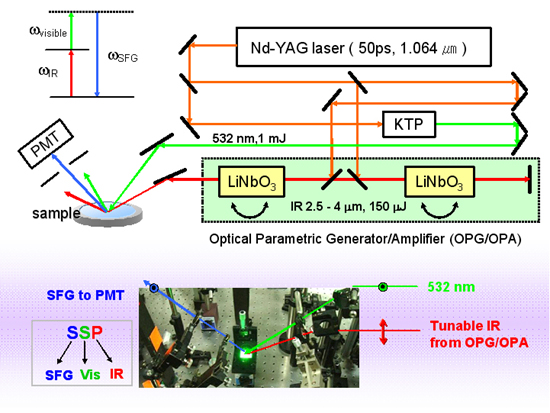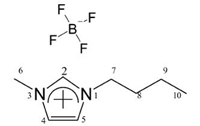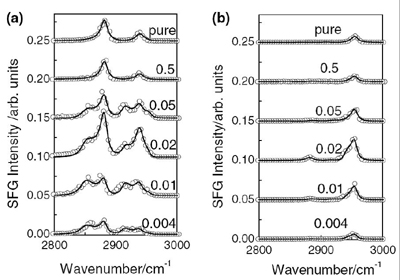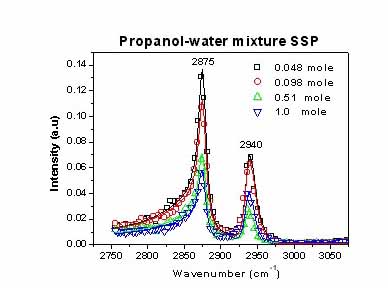SFG
From SMOSwiki
Sum Frequency Generation (SFG)
The structure of molecules at the air/liquid interface has been a very interesting subject due to their importance in fundamental science and application in industry. But, in the spite of this importance in the various fields, understanding the molecular properties of air/liquid interfaces was very poor due to the lack of a probe capable of detecting molecular sensitivity.
SFG has proven to be a powerful technique to prove surface structure at various interfaces. This technique uses the second-order nonlinear optic effect, which only exist on the region to break the centrosymmetry. Due to this reason, that is a good probe to find the molecular structure or number density at the interface. Below figure represents the two beams mixing at the liquid surface, and these two beams induces the SFG beam at the surface selectively.
water+IL mixture
The previous research about water+IL (Ionic liquid) binary mixture focused on the structure and concentration of the IL molecule at the air/IL interface. Ionic liquid (IL) are consisted with cation and anion, and left figure represent the chemical structure of 1-butyl-3-methyl imidazolium tetrafluoroborate ([BMIM][BF4]).
For pure {[BMIM][BF4] in below figure, peaks in the range from 2800 to 3000 cm-1 originated from the butyl chain attached to the imidazolium ring; peaks at 2882, 2939 and 2955 cm-1 are attributed to the modes of vSSCH3, vFRCH3,vASCH3, respectively (SS represents the symmetric stretch mode, FR represents the Fermi resonance mode, and AS represents the antisymmetric stretch mode) with ssp polarization (s:SFG, s:visible, p:IR). In the below figure the CH3 symmetry stretch mode peak is enhanced at ~0.02 mole fraction and then gradually reduced to the pure IL. This data was supported by surface tension measurement.
Sung et al., Chem. Phys. Lett. 406, 495 (2005)
Sung et al., Colloids and Surf. A 284, 84 (2006)
water+alcohol mixture
The previous research about the interface of the water+alcohol binary mixture focused the orientation of the alcohole molecule. The presented results suggested the alcohol molecule is upright from the air at the low concentration. In the below figure the CH3 symmetry stretch mode peak (~2875 cm-1) is enhanced at the 0.05 mole fraction and then gradually reduced to the neat propanol solution. This passion is consisted to the previous results in methanol+water binary solution.
Sung et al., J. Kor. Phys. Soc. 44, 1394 (2004)
Sung et al., J. Phys. Chem. B 109, 18507 (2005)




